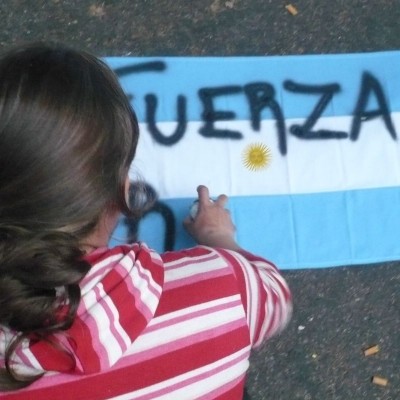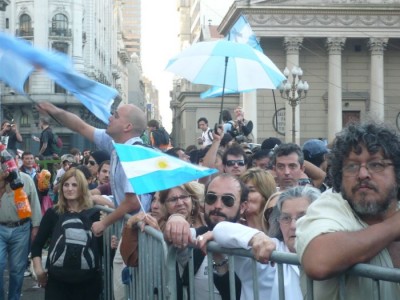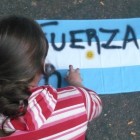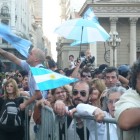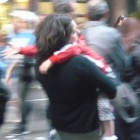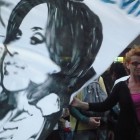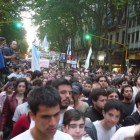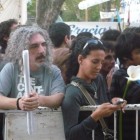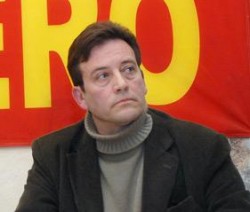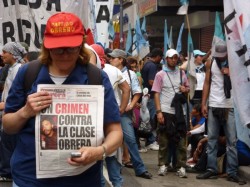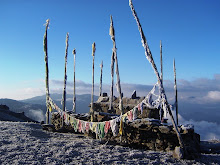la mejor nota que puede leer en estos dias (de las decenas que lei). Pablo Marchetti de Barcelona.
---
Para Claudia Acuña, con amor peronista
En el final de la cola, unos ocho metros antes del féretro, en uno de los corredores de la Casa Rosada, una piba llora. Sí, una piba: 16, 17 años, como mucho. Divina, cándida, antelical. Una chica que bien podría uno imaginarse llorando así con una novela del Cris Morena Group o con la llegada de los Jonas Brothers, aunque un poco más hippona. Si Néstor Kirchner hubiera sabido que lo iba a llorar una piba así capaz que no se moría.
Ok, lo que acabo de decir es una reflexión machista, pelotuda, lo que quieran. Olvídense. Pero a ver si queda claro: la plaza de Mayo y sus alrededores se llenó de pendejas y pendejos divinos, pibes muy chiquitos, adolescentes y jóvenes conmovidos por la muerte de Kirchner. Pibes que transformaron en hit el canto “andate Cobos, la puta que te parió”, o su versión extendida: “Andate Cobos y llevate a la Carrió”. O sea, pibes y pibas que hicieron su lectura política del asunto. Pibes y pibas militantes.
Todos putos
Un pibe escribe con aerosol, en el piso, sobre la avenida de Mayo, casi Bernardo de Yrigoyen, Néstor VIVE, y sobre cada una de las V de la palabra VIVE escribe una K, reemplazando la P peronista del PERÓN VUELVE. Me río: se lee KK. O sea, caca. Evalúo por un momento la posibilidad de compartir mi hallazgo con el pibe que escribe con aerosol. Y lo imagino contestándome: “De caca te voy a llenar la cabeza, puto”. Pero no, descartado. El pibe no diría eso. Parece más un pibe que pudo estar tomando un colegio anteayer. Más rockero que cumbiero. Clase media porteña, laburante. El pibe de la fotocopiadora, ponele. Hasta es probable que ni sea peronista. Nada de “eh, puto”. Y menos ahora que a su lado pasa una columna (bueno, un grupito con pancarta), unas treinta personas que llevan orgullosas el cartel que dice “Putos peronistas”.
Sí, los putos y las travas también. En la fila, a ocho cuadras de Plaza de Mayo, está Marlene Wayar, la hermosa Marlene, altísima, flaca, ojos enormes, sonrisa transparente, la voz más lúcida de la diversidad sexual, el pensamiento más sexy del país, una travesti que no cree en el matrimonio pero cree en la igualdad. Quién lo hubiera dicho, Marlene en la fila para ver a Néstor. ¿O debo decir “en la cola”? Sí, Marlene en la cola de Néstor, que esta noche es también promiscua y libertina. Que esta noche es todos con todos, todas con todas, todos con todas, todas con todos, todo con todo. Esta noche, la del pastiche que supimos conseguir. Unámonos. Abracémonos. Te amo, Marlene. Qué bueno que estés acá.
Noche de abrazos
Esta es una noche de abrazos. Me abrazo con Marlene, me abrazo con Claudia Acuña (bueno, con Claudia siempre nos abrazamos), me abrazo con Mariana Collante, me abrazo con Eduardo Anguita (sí, aquí estoy, Eduardo, ¿dónde iba a estar?), me abrazo con Dani Tavarone (Dani, qué linda sorpresa, tanto tiempo), me abrazo con Maxi Vecco (responsable de los videos de ¡Mueva la patria!), me abrazo con mi compadre falopero Felcho Marquestó (nos encontramos de casualidad; él fue a la plaza con Ramón, su hijo de 8 años), me abrazo con el gran Poroto D’Addario, exquisita pluma chabona de Página 12, que está haciendo la cola a la altura de Bernardo de Yrigoyen entre Avenida de Mayo y Rivadavia, me abrazo con Juampi Pichetto, a quien hace años que no veo, y en qué andás, y me cuenta que está haciendo Clase Turista, y me alegro, qué buen programa, y nos fumamos esa tuca que queda, qué bueno vernos, pensamos, y claro, cómo no íbamos a estar acá.
Aquí estamos. Con esa bola de nervios, esa bola de cagazo y esa bola de emoción al vernos, al constatar eso, que aquí estamos. Somos bien distintos y de repente nos damos cuenta de que también podemos ser bien iguales. O que, bueno, esto es lo que nos une. Que no debería haber rencores a partir de esto. Que sí, después da para discutir, para cagarnos a puteadas, a bardearnos, a mandarnos a la concha de nuestras madres o a la puta que nos parió, que si ya llegaron los putos es probable que en cualquier momento también lleguen las putas peronistas, y tampoco tengamos miedo a volvernos un poco trogloditas (o a seguir siendo peronistas, como prefieran), ahora que todos estamos aprendiendo a ser más correctos. Pero siempre teniendo en cuenta esta noche. A bardear, a discutir, pero sabiendo cual es nuestro lugar en el mundo, dónde vamos a marchar cuando las cosas se pongan pesadas. Pensemos en Néstor.
Pensemos
Eso, pensemos en Néstor. No por obligación, sino porque eso es lo que nos sale: pensar, reflexionar, intentar hacer política. Porque después del abrazo, del reconocernos, de la certeza a mitad de camino entre el “qué bueno que estás acá” y el “claro, cómo no ibas a estar acá”, llega la discusión, la reflexión. Si hay algo para lo que sirvió esta noche es para constatar un par de cosas que, hasta hoy, no eran más que cuestiones que se afirmaban sobre la intuición. Ahora nos damos cuenta que era verdad, que la política había vuelto, que la militancia había vuelto. Y esta, la noche del Chau Néstor es la noche de la política y la noche de la militancia.
La vuelta de la política. La vuelta de la militancia. La vuelta de los pendejos a la militancia. Pensemos en Néstor. No, no fue Néstor quien construyó todo esto. Si Néstor fue apenas un gobernador peronista de los 90. Un gobernador de una provincia petrolera que estuvo en la primera línea de combate de la privatización de YPF. Un aliado de Menem y Cavallo. Un tipo al que, antes de llegar a ser presidente, jamás le importó lo que decían los movimientos de derechos humanos, que jamás se preocupó por los crímenes de la dictadura y que, encima, era el candidato de Duhalde.
Sin embargo, Néstor no sólo no defraudó, sino que sorprendió. Uno no esperaba casi nada y el tipo se mandó con varias cosas inéditas y esperanzadoras. Y siguió, aunque todas podrían resumirse en una: no tengo claro si Kirchner era mi amigo, pero estoy seguro de que irritaba a mis enemigos. No sé si a todos (las críticas que tuve, tengo y tendré tienen que ver con eso, con aliados impresentables), pero sí a muchos. Demasiados para los que nos tenía preparada la historia argentina. Y estas cosas sólo se pueden medir en perspectiva histórica.
Juan Domingo K
Más allá de las críticas que puedo tener, creo que Néstor Kirchner (él y Cristina) fue el mejor presidente de la Argentina en los últimos 50 años. O, más precisamente, el mejor desde Perón, desde el primer peronismo, el de los 50. O, para decirlo en términos más constatables, fue el que más se enfrentó a mis enemigos y a los enemigos de toda la gente que vino esta noche. Por eso hay tanta gente que dice “yo no lo voté, pero aquí estoy”, “yo no soy peronista, pero aquí estoy” o “yo soy de izquierda, pero aquí estoy”, como me dijo el pibe que subía al lado mío por las escaleras mecánicas del subte E, cuando llegué a la plaza el jueves a la tarde.
Sí, el mejor desde Perón. Juan Domingo Perón, para más datos. Un milico con simpatías por el Eje durante la Segunda Guerra Mundial, que participó en los primeros golpes de Estado de la Argentina, como oficial del Ejército. Un tipo del que no había mucho que esperar, o más bien de quien se podía esperar lo peor. Sin embargo…
Como Perón, Kirchner hizo mucho más que lo que se esperaba de él. Pero hay algo más que identifica a ambos líderes, a ambos presidentes. Está claro que el peronismo es algo mucho más trascendente, mucho más complejo y mucho más rico que la figura de Juan Perón. Pues bien, si el kirchnerismo es esta plaza, si son esos pibes (y también esos señores, esas señoras, esos laburantes, esos viejitos, esos putos, esos fumones, esos oficinistas, esos fans de 678, esos flacos que se están tomando una birra, toda esa gente que hace seis, ocho, diez horas que está haciendo la cola para pasar 30 segundos a cinco metros del ataúd cerrado donde está el ex presidente), está claro que ese movimiento político y social trasciende con creces a Néstor Kirchner.
No, Néstor no construyó todo esto, pero Néstor fue quien lo leyó. El emergente y, al mismo tiempo, quien abrió el juego. Olvidémonos de la lista de virtudes (Corte Suprema, estatizaciones, juicios a los represores de la dictadura, asignación universal, integración continental) y defectos (pejotismo, mineras, petroleras). En otro momento podemos discutir todo eso. Ahora es el momento de centrarse en el principal logro de este Gobierno: la militancia.
A lo chori
“Chipa, chipa”, grita la paraguaya, sentada en un banquito, con su puestito improvisado donde vende el modesto manjar guaraní. Chipa y no chipá, que quede claro. Acaba de llegar, son las once de la noche. “A la rica chipa”. A su lado, una mujer vende pósters con la foto de Néstor y Cris, y papeles y fibrones. ¿Para qué? Lo aclara en el papel que tiene escrito: “Néstor, siempre con vos”, dice el papel, escrito con fibrón. Que cada uno escriba lo que quiera, pero que todo el mundo sepa que puede escribir cosas como esa, como una forma de hacer catarsis o de romper el cerco mediático de Clarín.
Más allá, un tipo comienza a prender la parrilla. “El chori y el paty salen como piña”, me dice un parrillero que está prendiendo otro fuego porque ya agotó stock y va por el ballotage. Se venden también banderas, cintas negras, escarapelas. Y para beber, gaseosas, cerveza, café. Me cuenta Mariano Lucano (estoy caminando por avenida de Mayo con él y con Flavia, su novia) que en el entierro de Alfonsín (no, no fui) no había choris ni nada de eso. Pero que, a cambio, el McDonalds de enfrente del Congreso estuvo abierto toda la noche.
Acá los negocios están cerrados. Los bares bajaron sus persianas después de la medianoche y sólo quedan algunos, poquísimos, maxikioscos. Por eso a la una de la mañana se siguen prendiendo parrillas. Puede parecer liturgia peronista, pero acá los compañeros tienen hambre. Y el chori se cobra, eh. No se regala, eh. Que acá no hay micros, no hay aparato, loco, eh. Nadie vino por el chori y la Coca. Ni siquiera vino por Néstor. Acá la gente, la mayoría de la gente, vino a hacer el aguante y a no sentirse tan sola. Vino a tratar de dejar claro que esta vez no, no nos van a volver a cagar.
Qué grande sos
Sí, claro, los pendejos. Sí, claro, la clase media progre. Sí, claro, los zurdos, los intelectuales, los universitarios, los profesionales. Por supuesto, todos ellos están. Pero también está el peronismo. También está la gente que se tuvo que tomar tres bondis para ver el cajón. Está Zulema, que vino de San Justo. Está la gente del Docke y otros que vinieron desde las provincias. También están (en primera línea) los militantes peronistas de veintipico, de treintaipico, esos productos tan típicamente Néstor que volvieron a sentir orgullo de ser peronistas. Que cantan la Marcha y se emocionan y hacen emocionar a quienes alguna vez nos emocionamos cantando la Marcha.
Otros hits: “Olé, olé, olé/ Nestoooor… Nestoooor”, con acento en la “o” alargada final. Pero sobre todo uno, bien peronista, que advierte: “Che gorila, che gorila/ no te lo repito más/ si la tocan a Cristina/ qué quilombo se va armar”. Ese y el de Cobos son los más escuchados. Los pibes proponen, advierten. Nadie dice boludeces, ni nadie evoca fantasmas. Hay un mensaje concreto: no jodan. Y viendo toda esa gente, sintiendo la emoción y la onda que hay en el aire, por un momento da para el entusiasmo, da para pensar que quien sabe, tal vez…
Oficialitis
Néstor irritó a nuestros enemigos y más allá de las diferencias, más allá de las medidas y aliados impresentables, más allá de la minería y el pejotismo, el espanto que generaban esos enemigos siempre pudo más. Y cada vez que alguno de estos enemigos mostraba los dientes y las uñas daba ganas de volverse más K que Orlando Barone. Sí, lo confieso: muchas veces, escuchando a Biolcatti, leyendo a Morales Solá o a Mariano Grondona o viendo algunos títulos de Clarín me dieron ganas de pasar por la galería Bond Street, tatuarme la cara de Néstor y Cris en la espalda y después salir, ir al estudio de Canal 7 donde se graba 678 y decir: “Mirá, Barone, a que vos no tenés un tatuaje así, soy más oficialista que vos”.
Desde el miércoles, cuando Néstor la quedó en Calafate, las bestias comenzaron a mostrar los colmillos. Son los mismos simios gigantes que quisieron dictarnos lecciones republicanas impresentables luego del velorio de Alfonsín, sin olvidar que ellos habían odiado a Alfonsín. Pero claro, Alfonsín se quedó ahí. Lo intentó tibiamente, arregló, no supo. Sí, por supuesto, vivió modestamente, no como estos millonarios santacruceños. Pero políticamente terminó devorado por sus enemigos, sin siquiera haber atinado a pelear como es debido. Se confió, actuó como una persona y, como tal, creyó en la humanidad de las bestias que lo rodeaban.
No, Néstor no era de esa estirpe. Néstor peleaba. Por eso, como bien dice Beatriz Sarlo, prefirió no convertirse en patriarca y morir luchando. Por eso, en su despedida, no hubo ningún Biolcatti, ningún Cobos, ningún Morales Solá, ningún Duhalde. Sí, claro, nadie se alimenta de vidrio: sí hubo un Scioli o un Gioja. Pero otra vez: se podrá criticar a los amigos, pero nunca se dudará de la calaña de los enemigos. Porque lo mejor de Néstor era cuando no dialogaba con quienes reclamaban diálogo pero en realidad querían exigir, y cuando se peleaba con quienes merecían que los cagaran bien a trompadas.
No se trata aquí de comparar entierros. Pero no sólo es necesario dejar en claro que a Néstor lo despidió por lo menos el doble de la gente que le dio el último adiós a don Raúl. También sería bueno recordar que entonces hubo algunos imbéciles que destacaron lo masivo del entierro de Alfonsín (que lo fue) y presagiaban una muerte en soledad para Néstor. Que la chupen, que la sigan chupando. Vos, gorila republicano, la tenés adentro. ¡Vamos todos! “Tomala vos/ dámela a mí/ el que no salta/ es de Clarín”.
9 años no es nada
Camino con Mariano Lucano y de repente tengo un dejà vu. ¡Esto parece el 2001! Cuando también caminé con Mariano, por estas calles, dos años antes de Barcelona. Bueno, no, nada que ver: todo está tranquilo, no hay represión, ni siquiera un poquitín de clima tenso o jodido, ni siquiera una pizca de paranoia. Hay miedo, sí, pero es un miedo por el devenir político, no por el presente, no por la caminata por estas calles. Y hay que decirlo aunque suene pelotudo o inocente: hay esperanza. Por lo demás, estamos como entonces. Nueve años no son nada. Somos los mismos que entonces. Y algunos otros, más pendejos, que podrían haber estado ahí.
Mariano me cuenta que ayer se cruzó con Diego Parés (el dibujante que mejor retrató el 20 de diciembre de 2001) y con el Niño Rodríguez. Me imagino que deben estar (como Mariano, como yo) descosiéndose el cerebro pensando en qué carajo van a decir, qué corno es lo que van a dibujar de todo esto. A mí se me enquilomba todo. No puedo parar de pensar, como todos los que estamos aquí. Como no podemos (sí, lo bueno de esto es lo fácil que es pasar del “yo” al “nosotros”) dejar de sorprendernos y emocionarnos, como todos los que estamos aquí.
Gracias totales
Aquí abunda el análisis político al paso. Lo admito, no puedo parar de hablar con todo el mundo. Charlo, discuto (ya lo dije, ¿no?). Por supuesto, se habla de quién ocupará el lugar de Néstor. Quién se bancará al PJ, quién evitará el aluvión Scioli, cómo hacer para no cagarla en este momento político que, bien manejado, puede ser bastante favorable para una salida digna. O sea, para evitar que el Mal Mayor se haga cargo del asunto. Y para neutralizarlos por un buen rato. El precio a pagar puede significar el convencimiento casi religioso de que aquello que considerábamos el Mal Menor se transforme de repente en un Bien Aceptable. O al menos que mude su domicilio a los suburbios del Bien, a pocas cuadras del Riachuelo o la General Paz del ideal ideológico.
Más allá de la especulación macro política, el verdadero desafío es ver cómo articular todo esta voluntad colectiva, este montón de ganas, de abrazos y de emoción al margen de toda especulación electoral. Por supuesto, lo electoral existe y es relevante. Pero nadie piensa en Máximo o en Alicia por aquí. Ya se verá si el hijo presidencial puede realmente ser una opción y si eso realmente puede ser bueno. Por el momento, parece tener menos carisma que Fabián Matus, pero estos momentos suelen hacer milagros. Si no, mírenlo a Ricardito Alfonsín.
Lo que realmente importa ahora es cómo salir de esta plaza. Y lo más importante, cómo hacer para volver a encontrarnos todos aquí, con esta misma emoción, con esta misma fuerza. Cómo tener la certeza de que, si nos joden, aquí vamos a estar. Aguantando los trapos. No los de Néstor ni los de Cristina. Los nuestros, los de los montones de personas que no queremos que nos rompan las pelotas. Los de todos aquellos que estuvimos horas y horas esperando para ver durante 30 segundos un ataúd cerrado, porque sabíamos que allí adentro había un tipo especial.
Un tipo que no fue ni un héroe revolucionario, ni un gran ideólogo, ni siquiera alguien muy parecido a nosotros. Sin embargo, ese tipo fue quien hizo el milagro de juntarnos, de hacernos tomar conciencia de que somos un montón y de darnos cuenta de que hay ciertas cosas que no vamos a permitir. Bueno, no exageremos, que somos frágiles. Pero al menos ahora sí tenemos claro que hay cosas con las que no se jode. Por eso, aunque sólo sea por eso, gracias Néstor.
